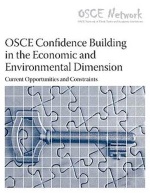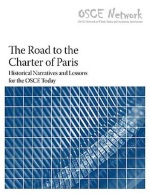 Report on OSCE Confidence Building in the Economic and Environmental Dimension published on 13 December 2017
Report on OSCE Confidence Building in the Economic and Environmental Dimension published on 13 December 2017
 Report on OSCE Confidence Building in the Economic and Environmental Dimension published on 13 December 2017
Report on OSCE Confidence Building in the Economic and Environmental Dimension published on 13 December 2017
 Drafting Group: Christian Nünlist (principal author, Center for Security Studies (CSS), ETH, Zurich; Juhana Aunesluoma, Network for European Studies (NES), University of Helsinki & Benno Zogg, CSS, Zurich.
Drafting Group: Christian Nünlist (principal author, Center for Security Studies (CSS), ETH, Zurich; Juhana Aunesluoma, Network for European Studies (NES), University of Helsinki & Benno Zogg, CSS, Zurich.
Published by OSCE Network of Think Tanks and Academic Institutions, Vienna, December 2017, 37 pages
Ida Manton, representative of Diplomacy Dialogue in Skopje, contributed to this report by providing constructive feedback on an initial draft version of this report as member of the academic reflection group.
It is widely accepted that the successful implementation of the Sustainable Development Goals (2030 Agenda) for the benefit of least developed countries will require boundary spanning by United Nations agencies, G20 countries and leading development nongovernmental organizations. Realization of the Sustainable Development Goals also requires cross-sector cooperation and crossinstitutional cooperation among international organizations mandated by G20 members to implement their own development strategies for the poor.
However, international organizations are not sufficiently equipped to deal with the cross-sector and cross-institutional cooperation needed to achieve the goals, commonly known as the SDGs. They also are often not at ease in cooperating with leading nongovernmental and philanthropic organizations – even when operating in the same policy space.
Raymond Saner, „Mit der Erschöpfung kommt der Frieden in Syrien“ (Peace in Syria once warring parties reach exhaustion)
Frankfurter Allgemeine Zeitung (FAZ), interview von Raphael Rauch, 10th April 2017
Raymond Saner & Lichia Yiu, “The 2030 Agenda: no poverty reduction without policy coherence” G20 Germany 2017, Think 20 Dialogue, DIE Bonn, 28 March 2017
G20 member countries play a crucial role in international organisations by the collective size of their economies and combined political weight, both of which are needed to make the policies of international organisations as coherent as possible to reduce poverty in Least Developed Countries (LDCs).